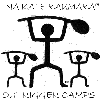
THE HANA HOU SERIES Respecting Your Outrigger © 1999 Kawika Sands |

THE HANA HOU SERIES Respecting Your Outrigger © 1999 Kawika Sands |
|
RESPECTING YOUR OUTRIGGER (or Outrigger 101) 1. Respect every canoe as a family member. From the time a canoe is made and blessed, the canoe becomes an entity unto itself. Care for it as a loved one by maintaining it before setting out to sea and cleaning it after you return. Never sit on, or step over, a canoe (exceptions are sometimes made for dry-land training or demonstration purposes). If you must, support the hull along the kua`e/keel (the center line along the outside/bottom of the hull) in a way that will distribute the weight evenly to avoid placing too much stress at any one point. In Hawai`i, it is believed that to step over another is to cut their life shorter, therefor, the same applies to your canoe. 2. On land, the canoe always faces the ocean. This relates back to ancient Hawai`i when canoes were frequently used to repel attacks from other islands. "Stacking" is sometimes necessary to accommodate available space (placing the ama of a subsequent canoe on the `iako of a previous canoe).
3. Care should also be taken for the area surrounding the canoe. Pick up
opala (rubbish) on and around your paena wa`a (canoe landing), halau wa`a
(canoe house), or auha (canoe shed). Put things away that need to be stored
without being asked.
4. Everyone helps when the canoe is being carried, covered, cleaned or cared
for. This includes loading and unloading the canoes, covering or storing
them, cleaning them and washing them down with fresh water (especially the
lashings) when they are dirty or after practice, and checking all parts of
the canoe before and after practice. This applies to every member of the
club from the first time novice to the president. From ancient times,
whenever there was a large undertaking, everyone would help by doing
whatever they could. The strong would do the work, the old would offer
encouragement and advice, and the young would bring the water and food, but
everyone would participate. 5. Customarily, a prayer is always said before every launching no matter how long or short the voyage. The prayer needn't be long and perhaps not in Hawaiian, nor does it have to be religious in nature. Doing so helps center the crew mentally and spiritually (no religious reference).
6. On water, avoid standing, arguing and swearing in the canoe. Standing is
rarely a good idea for stability and safety reasons anyway. Arguing and
swearing only serves to upset the entire crew's efforts and create animosity
instead of aloha. Avoid tracking dirt and sand into the outrigger when you
climb aboard.
7. Learn the particular duties that go along with the seat you sit in. Once
you step into a canoe you are part of a team. Therefor every hoa wa`a
(canoe mate) must work together by doing his share. The only way to know
what is expected of each member is to have clearly defined assignments
before hand. 8. See to it that personal issues are put to rest quickly instead of letting them collect and fester in your mind. Remember; what happens on land, stays on land, what happens at sea, stays at sea. Show respect, enthusiasm and commitment to your hoa wa`a by arriving on time to practice (steersmen, coaches and other leaders should ALWAYS arrive early). -A leader is never on time, he is always early. 9. Take the time to study and learn the proper Hawaiian names and pronunciation of the things you use. On this issue, if you choose to use English (usually the case), or Tahitian, etc. that is entirely fine. But if you choose to use Hawaiian terminology, take care in its' pronunciation (and use). Many Hawaiian words have multiple meanings or have different meanings if pronounced incorrectly. Lest you be guilty of `olelo ho`ohepa (idiot talk).
|

Last Modified: Saturday - 19991113.12:36 EST
Copyright © 1999 Kawika Sands
Produced online by HoloHolo Internet Publishing all rights reserved